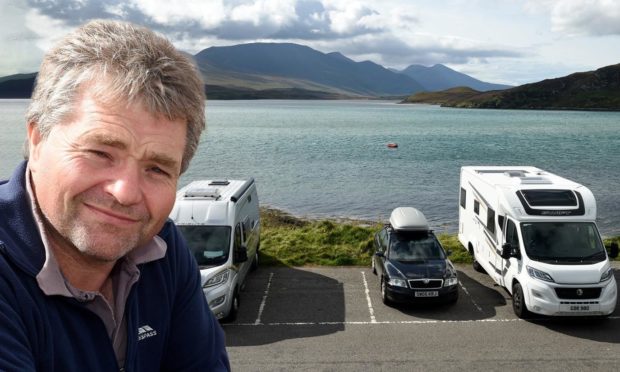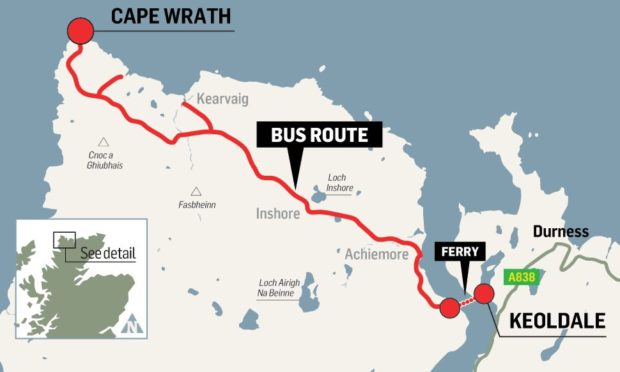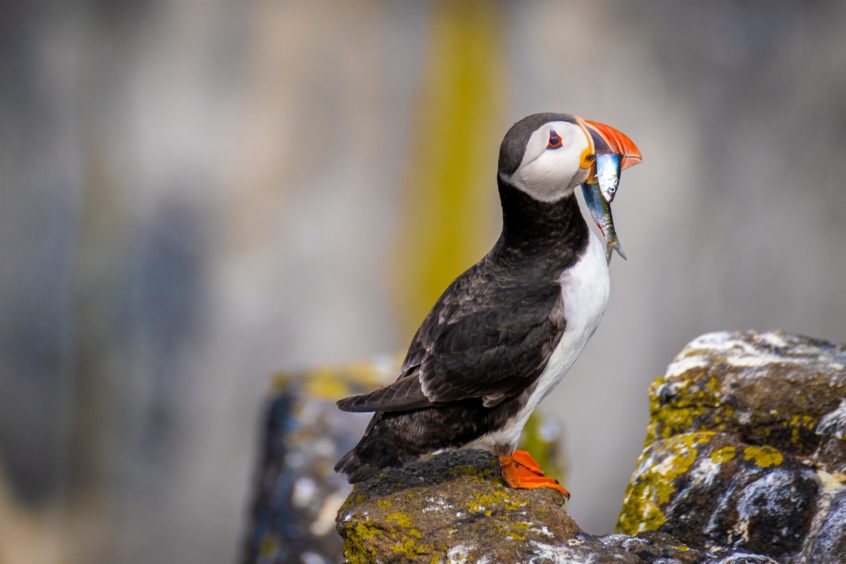The rugged and remote terrain at Cape Wrath takes its name for the Norse for turning point.
James Mather hopes that’s the case for his bus service as he restarts business after a 21-month break.
With lockdown restrictions easing, he is again making the one-hour seasonal journeys over 11 miles of rough track.
It’s the only road to the most north-westerly point on the Scottish mainland.
For Mr Mather, who is also a lobster fisherman, it’s a welcome return after battling against the challenges posed by Covid and Brexit in the past year.
‘It’s been a tough year’
“It’s been fairly grim,” he said. “I carried the last passenger on the bus in September 2019 so it’s been a fair spell of unemployment.
“Coupled with the fact I’m a lobster fisherman, which has also taken a pounding, it’s been the perfect storm.
“Covid, in effect, denied British people the chance to go to Spain to eat British lobsters. The Brexit legislation to get the lobsters to Europe is also very, very difficult.
“When you add the two things together, it creates a real problem for a small fisherman.
“I’m not pleading poverty, and I’m not out to get the sympathy vote, but it has been tough, there is no doubt about it.”
Until the pandemic struck, Mr Mather had operated the bus every year since 2010, taking over from his aunt, Iris Mackay, who ran the service for around 30 years.
He went from transporting 4,000 to 5,000 people a year to zero.
The resumed service will see the capacity of his minibus reduced from 16 to seven or eight to maintain social distancing, but it’s a start.
Mr Mather said: “We are keen to provide some kind of service at the earliest opportunity in a safe manner to try to meet some of the demand.”
‘If you’re loyal to the public, they will be loyal back’
Previously, the bus has operated without the need to book. But the reduced capacity could mean extra trips to ensure passengers are catered for.
“That’s not really viable, but it does provide a service and hopefully it will stand us in good stead for the future.
“It’s about future-proofing rather than trying to make money at this time. Generally, if you are loyal to the public they will be loyal back.
“We’re trying to keep the place on the map and have some service going, albeit in a much reduced way. I hope in years to come we can regain what we had and I think we will.”
Area home to tens of thousands of birds
The cape was historically of strategic significance to Viking explorers and the area was once home to several crofting communities.
In the 1930s it had a population of around 30-40 and a small school.
Today its population is largely birds, the special protection area (SPA) and site of special scientific interest (SSSI) is home to tens of thousands of breeding birds including puffins, razorbills, fulmars, kittiwakes and guillemots.
This and its isolated location – 107 square miles of moorland wilderness separated from the rest of the mainland by the Kyle of Durness – attracts visitors eager to view the stark landscape and wildlife.
There’s also the Cape Wrath Trail, an unofficial long-distance route from Fort William.
It is also used by the Ministry of Defence as a training area for British and international troops.
The peninsula can only be accessed by a small passenger ferry that the bus meets for onward travel.
The 10-minute crossing, which started again in May and runs until September, has been catering for walkers and cyclists visiting the area.
It stopped for around two months last year due to lockdown.
Ferryman Malcolm Morrison has now also started a bike hire service to cater for growing demand from cycling enthusiasts.
As the bus returns, the future maintenance of the crumbling road will be discussed later this year.
Mr Mather has spent thousands of pounds of his own money maintaining and repairing the route, although a Highland Council team is visit in the next few weeks to assess its condition.
Hopes of returning to full capacity by the summer
A further meeting, also involving the MoD, is also planned.
In the meantime, Mr Mather, who normally starts the bus service at Easter, says there is pent-up demand from visitors.
“We have had more and more inquiries as the year has gone on.
“I’m hoping that if restrictions ease further it may be back to full capacity this summer. We’ll do our best.
“Going from 4,000-5,000 to nothing hit us hard and we are already behind this year.
“But, then, if you don’t do something people will lost a taste for it quickly. I’m still keen to make things happen.
“Cape Wrath – Turning Point – is a very apt name. This may well be it for the next chapter of excitement.”


